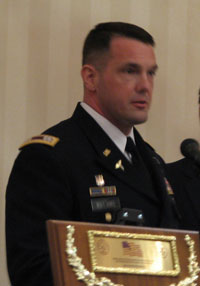 |
Army Capt. Patrick Williams, left, receives the Army PA of the Year Award from Paul Lowe, president-elect of the Society of Army Physician Assistants (SAPA). Photo courtesy of SAPA. |
In addition, the Society of Army Physician Assistants named Williams the 2007 Army PA of the Year during a ceremony in late April.
“I consider these awards very humbling due to both the quality of the pool of incredible PAs nominated, and by the caliber of officers who selected my actions for the year,” Williams said. “I really hope the most significant outcome of this is greater appreciation for what PAs do for our country — whether civilian or military — and betterment of the profession.”
Williams, a certified physician’s assistant with a degree from UNMC, is the son of Sheryl Williams and Chuck Williams. He is stationed at Fort Richardson in Anchorage, Alaska, and is in the process of moving his family to San Antonio, where he will train soldiers in combat and operational medicine.
Since his return from Iraq, he has been working in primary care (chronic and acute) for active duty and activated National Guard and Reserve soldiers either returning from Iraq or preparing to go there.
Williams graduated from the Interservice Physician Assistant Program (IPAP) in partnership with UNMC in September 2000 with a bachelor’s of science in physician assistant studies.
For the past 11 years, UNMC has been awarded the government contract with the IPAP at Fort Sam Houston in San Antonio, where each branch of the military is located. Since 1998, UNMC has graduated 1,250 PA students through that program, said Alice Laski, PA distance coordinator for the UNMC physician assistant program.
“The education I received from IPAP and UNMC completely prepared me for clinical practice with both the knowledge and technical skills I needed to enter the PA profession as a competent provider and health care leader,” Williams said.
In an excerpt from his nomination for the surgeon general award, his nominator wrote: “Capt. Williams provided outstanding routine, preventive and emergency medical care to the soldiers … during our deployment in support of Operation Iraqi Freedom. His knowledge of tactical casualty care is the best I have ever seen among physician assistants. He provided superb training to the medics of his battalion, instilling the fundamentals of combat casualty care that led to life-saving care on the battlefield. He provided combat lifesaver training to over 150 non-medical soldiers of his battalion further building his unit’s confidence in the care they would receive should they become injured … He also provided medical training to over 150 Iraqi police cadets, thereby working to ensure capable Iraqi security forces.”
Williams said his battalion task force of 750 soldiers had only one killed in action. “This is very rare for an infantry battalion,” Williams said. The young infantryman, Alex Jordan, died during a patrol north of Sadr City in Baghdad, he said.
Between August 2005 and December 2006, Williams reportedly participated in more than 200 combat missions in the cities of Mosul, Tal Afar and Baghdad. According to the nomination, Williams’ knowledge of and experience with tactical casualty care also led to changes in medical logistics.
“He was the driving force behind the stockage of compressed gauze in theatre. This provided for an effective, yet lighter combat load, not just for providers and medics of his battalion, but potentially for all tactical casualty care providers supporting Operation Iraqi Freedom … he is a fearless soldier, an innovative thinker and an outstanding medical provider. … He embodies all that an Army physician assistant should be.”
The awards also resulted from Williams accompanying a nighttime riverine raid on the Tigris River using inflatable motorboats and a platoon-sized raid inserted by helicopter. On three occasions, he was personally engaged with enemy combatants.
During his second tour in Iraq, the 1987 enlistee received a Silver Star for distinguished gallantry and heroism in combat when he saved a soldier’s life in August 2005. The nation’s third highest honor was awarded to Williams for running through enemy machine-gunfire to reach the injured soldier, and then shielding him with his body while intermittently being shot at from about 30 yards away.